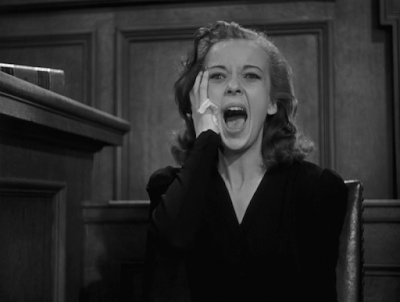Delicate, alluring but diamond-tough, with a satin-soft, come-hither voice, Lupino was born during a zeppelin bombing raid into an English acting family with roots in Renaissance Italy. Much sought after in Hollywood as direct, modern women with avaricious ambitions, as well as love-struck molls. Emerged as a pioneering writer, producer, director: the first and only woman to direct a film noir in the classic period.
 |
| With John Garfield in Out of the Fog |
Enrolled in the Royal Academy of Arts to please her theatrical father. After principal roles during her teens in a handful of British films, she was scouted by Paramount. Her performance in They Drive by Night was rewarded with a Warner Brothers contract and the fortuity to tackle hard-boiled material, albeit as emotionally brittle characters, opposite stalwarts of the era.
 |
| With George Raft in They Drive by Night |
Fawned over Bogart’s ‘Mad Dog’ Earle in High Sierra; tragically manipulated by racketeer John Garfield in the mist-enveloped Out of the Fog; shared the screen with the icon of French fatalism, Jean Gabin, in Moontide. Her categorical refusal to accept roles she felt were beneath her resulted in frequent suspension from the studio.
 |
| High Sierra |
 |
| With Jean Gabin in Moontide |
Took
a hiatus from psychological thrillers to appear mainly in musicals and
historical dramas before going freelance. In 1948 – the same year she became an
American citizen – appeared as a nightclub singer targeted by Richard Widmark’s
obsessive psychopath in Road House. A
one-two punch followed: noir western Lust
for Gold and thriller Woman in Hiding.
 |
| With Howard Duff in Woman in Hiding |
Formed
independent company The Filmmakers with then husband Collier Young. Their
mission to produce ‘issue’ pictures, her first directorial gig was Never Fear, about a fledgling dancer
stricken with polio. Confronted the traumatic subject of rape in Outrage. Directed the majority of Filmmakers’
productions, the most skilfully executed being The Hitch-Hiker, a mean-spirited noir in which she coaxed a
performance nonpareil from William
Talman as a sociopathic fugitive.
 |
| William Talman in The Hitch-Hiker |
Pioneered
product placement and shot in public places rather than sets on low budgets,
tight schedules. Fixated by strong female characters, roles that according to
Lupino had, “intestinal fortitude, some guts”.
Not
that she considered herself a feminist. Believed the key to her success as a
film-maker was to maintain “a feminine approach – men hate bossy females”.
Always ensured her nails were immaculately manicured and opined that men “are
more co-operative if they see you are fundamentally of the weaker sex”.
Glamorous studio property turned independent film-making force, Lupino retired in 1978. On set, her director’s chair bore the legend, “Mother of us all”. Created a close-knit family atmosphere to produce some of the era’s most challenging works.
Passed
away in Burbank, California, from a stroke in 1995.
Five standout roles
As
hand-wringing Lana Carlsen in They Drive
by Night, she flagrantly emasculates her husband. Accusing trucker George
Raft of her husband’s murder, she breaks into a fit of histrionics on the
witness stand, “It was the doors that made me do it!” A femme fatale before
they became de rigueur.
As
Marie, the doting moll in High Sierra,
she paints a lonely and vulnerable soul who craves the attention of Bogart’s
Roy Earle. Her self-esteem grows visibly as she develops from punching bag for
Earle’s thuggish associates to his main flame.
As
lounge singer Lily Stevens in tense noir Road
House, Lupino sings her own songs – in a dulcet husky tone – and, in a
stand for equality, sharply slaps Cornel Wilde when he chauvinistically
belittles her: “Silly boy.”
As
scheming Julia Thomas in Lust for Gold,
she doesn’t bargain on the vengeance of Glenn Ford’s gold-rich Dutchman when he
rumbles her true motivation. A femme fatale of the frontier, she is prepared to
sacrifice her husband’s life for his mercy – until the final force majeure.
As
blind Mary Malden in On Dangerous Ground,
she and co-star Robert Ryan expose the pain of their characters, penetrating
the most hardened of hearts to betray mutual needs and desires.
Clark Hodgkiss
 |
| They Drive by Night |
 |
| Out of the Fog |








No comments:
Post a Comment